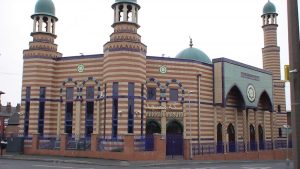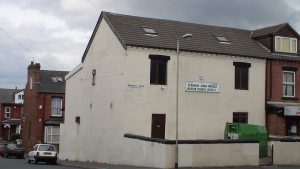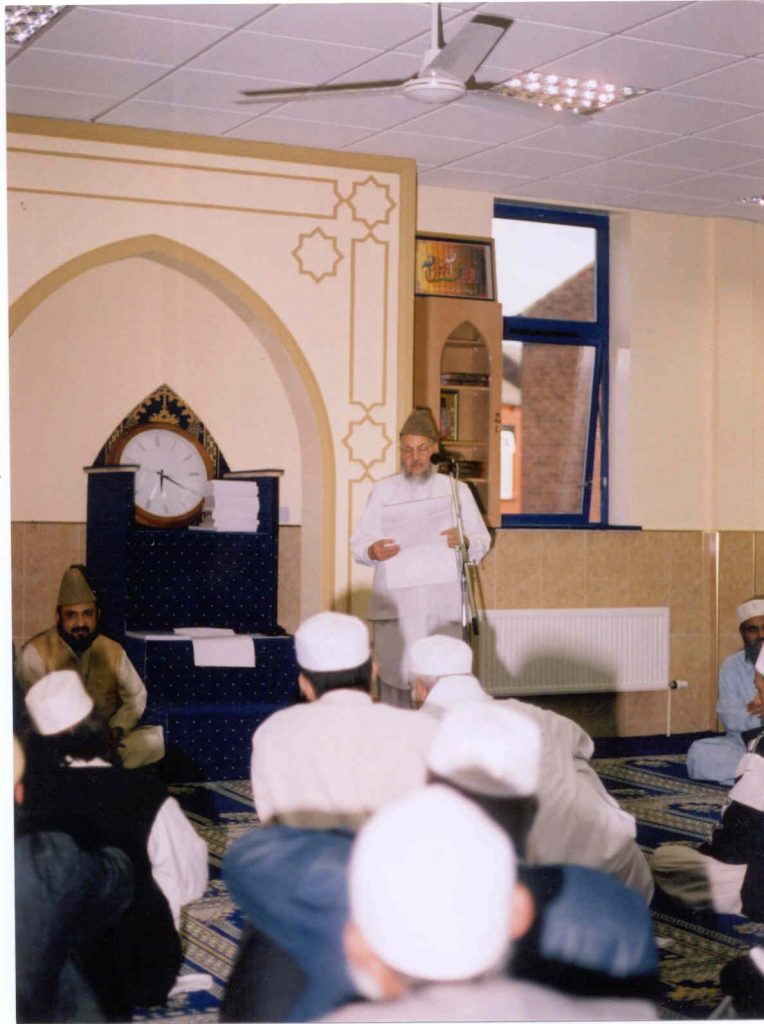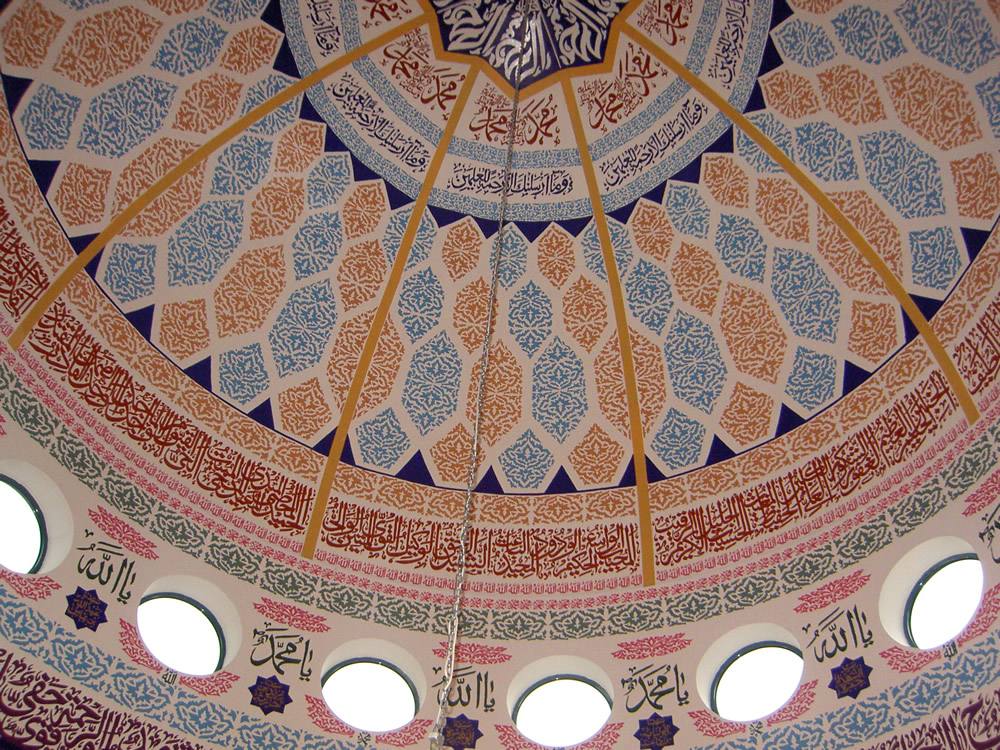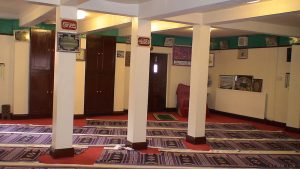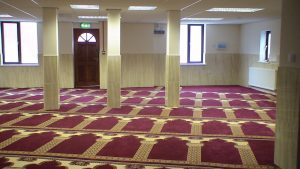29th August 2003 (1st Rajab) was a unique memorable day in the lives of the Muslim community of Leeds. This was due to the opening of a new magnificent mosque in the heart of Leeds city, in Leeds 6, called Makkah Masjid.
Makkah Masjid had been under construction for the last 3 years and it was finally completed last August with the total cost of £1.8 million. Previously, al-Madina Masjid had been fulfilling the needs of the Leeds 6 Muslim community. Al-Madina Masjid was founded in the early 1970s by purchasing 2 small houses and converting them into a mosque. However, as the Muslim community increased around Leeds 6, one house was incapable of accommodating all the attendees of large gatherings such as Friday or Eid prayers. Therefore, expansion of the al-Madina Masjid was deemed necessary. In 1989, some renovation and extension work was carried out at the cost of £60,000. After the extension, the al-Madina Masjid was able to accommodate 700 attendees. As time went by, Muslim population continued to increase in Leeds.
In mid 1990s, al-Madina Masjid again started facing problems in accommodating all the attendees of large events. For instance, for important Friday prayers, such as the Friday prayers in Ramadan, every part of the al-Madina Masjid would become full and people had to find place wherever they could to offer their prayers. Some people even had to pray in the kitchen, corridors or on the landing. Similarly, jamat for Eid prayer was said 2 times in order to allow all the Muslims of Leeds 6 and surrounding areas of Leeds 3 & 4 to perform their Eid prayer without any trouble. However, even with 2 jamaat, the mosque would become full and people would still face trouble to find a suitable place to pray. The problem of limited space became so intense that people stopped coming to the al-Madina Masjid and had to travel to other areas to attend the Friday or Eid prayers.
Leeds Muslim Council (the management committee of al-Madina Masjid) finally decided that increasing the size of the mosque was the need of the hour. However, like last time, this time al-Madina Masjid could not be extended as there was no next-door house which could be included into the existing mosque. It was also felt that a mere extension of the mosque would not be suitable for future needs. As the Muslim population would grow in Leeds 6, the mosque would again become small in size. What was needed was a purpose-built mosque that would be suitable to cater for all the possible future needs of the Muslims in Leeds.
To build a purpose-built mosque, a suitable location and land was needed. As Leeds 6 area is near the 2 universities, all the suitable lands had already been acquired by big businesses or were far away from the Muslim community’s residential area. There was only one property on sale which was thought to be suitable for the construction of a Muslim worship-place. It was a run-down church which had been abandoned for many years. As a matter of fact, it was a unique church which had been constructed with wooden structure and was a registered listed building. The plan was to buy the dilapadated christadelphian church, demolish it and construct a purpose-built mosque on the site. When this plan was presented to the Leeds City Council, they opposed the plan on the basis that the church could not be demolished as it was a listed building. A long and hard battle (with the help of local MPs and councillors) had to be fought with the local city council to convince them that the existing building (the church) was a place of worship, and the new building (the new mosque) would also be a place of worship. A survey of the local residents was also conducted to take their point of view on replacing the run-down church with the new mosque. Muslims and non-Muslims said alike that they were most happy to replace a ruined building which portrayed a negative image of the area with a uniquely constructed building which would add a fresh view to the area.
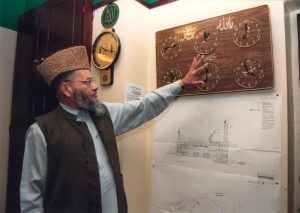
|

|
The new purpose-built mosque, called Makkah Masjid, was given a go-ahead in the year 2000, with the estimated total cost of £1.5 million and a time span of 3 years. As imagined, raising £1.5 million from the local Muslim community was conceived to be the most difficult and hardest part of constructing a new mosque, but with the grace of Allah (SWT) nothing is impossible or unachievable. As a matter of fact, when the plan of the Makkah Masjid was presented to the local MPs, and when they saw that the amount £1.5 million was needed to build the mosque, the only thing they said was: “this is impossible”. But the Muslims of Leeds 6 and surrounding areas of Leeds 3 & 4 put their faith in Allah (SWT) and believed that they were building the house of Allah, and trusted in Him to guide them through difficult and hard times. A great deal of strategy and planning was formulated by the Leeds Muslim Council before embarking on this laborious and demanding task. Before starting the work at the new mosque, priority was given to collect funds as the management committee did not want to stop the work on the new mosque by running short of funds. Only when enough fund had been collected, the work on the new mosque commenced.
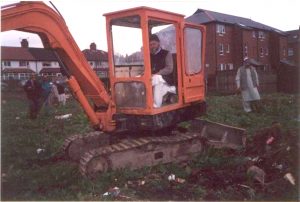
|
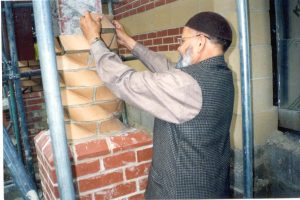
|
As mentioned above, the construction of the Makkah Masjid was estimated to cost £1.5 million which is a vast amount of money to be collected by one community. The Muslim community of Leeds 6 and surrounding areas does not comprise of big businesses or entrepreneurs, but of standard jobs such as taxis or take-aways. But when it came to contributing for the new mosque, the Leeds Muslim community opened up their hearts and contributed generously for this great cause. The Muslim community realised that the new mosque was an important factor in their lives and a mark of Muslim identity in general, and they did not fall short in making their donations according to their best capacities. Some creative strategies were devised by the people to raise the level of funds. For instance, one person who used to work at a taxi stand, started collecting £1 each week from other taxi drivers and gave this money to the new mosque funds. Following this good example, other people from other taxi stands also started contributing in a similar way. Similarly, one barber shop started giving £10 each week to the new mosque fund. Following this step, other barber shops also started giving £10 weekly to the new mosque. It is often said that good behaviour in people leads to good behaviour in society, and construction of the new mosque is a good example where people contributed open heartedly by observing good actions of others. Collection of such vast amount of funds was made possible by constantly encouraging the Muslims to contribute to the mosque fund.
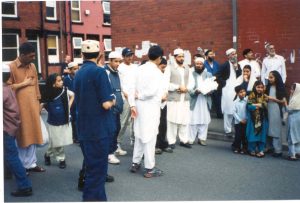
|
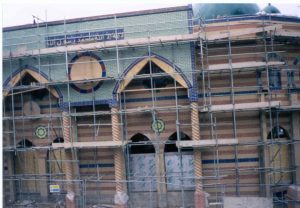
|
The members of the mosque committee set-up a good example by donating from £10,000 to £30,000 each. This good example inspired other members of the community and almost each household in the community donated at least £3,000. The whole process of building Makkah Masjid, including planning, raising funds and the construction work, took only 4 years. The construction of Makkah Masjid in such a short time was only made possible by the hard work of Leeds Muslim Council who were committed to put sleepless nights and long hours into this project and to see it to a successful completion. Leeds Muslim Council kept extremely good and close liaison with the Muslim community, created successful relationships with the local government, entrusted the jobs and duties to the most suitable persons and financially kept within their limits. With the grace of Allah (SWT), blessing of the Prophet (peace and blessings of Allah be upon him), generous contributions of the local Muslim community and the unwavering commitment of the Leeds Muslim Council, Makkah Masjid was finally opened on 29th August 2003 (1st Rajab 1424).
The opening of the Makkah Masjid coincided with the month of Rajab in which the ummah of the Prophet (PBUH) was given the gift of 5 daily prayers. Makkah Masjid is another gift of Allah (SWT) given to the Leeds 6 and surrounding areas of Leeds 3 and 4 Muslim community to establish the 5 daily prayers. Makkah Masjid has 3 floors and can accommodate over 2700 people, which is more than enough for the coming generations. There are 2 main halls for men to use and there is another main hall for ladies.
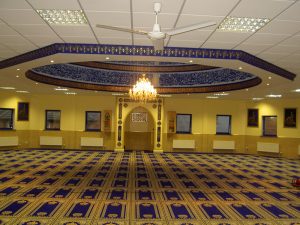
|
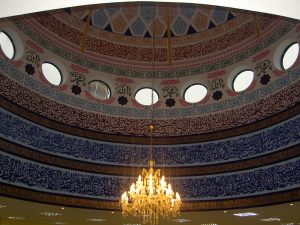
|
The mosque has 3 minarets and one dome. The mosque also includes rooms for computers and a library. The worshippers who attend the mosques are the actual beauty and charm of the mosques. However, while constructing the Makkah Masjid, the outward beauty and attractiveness of the mosque was also taken into consideration. Therefore, the outside walls are beautifully crafted by using a combination of blue, green and cream coloured tiles.
The old mosque, al-Madina Masjid is also open for prayers and will remain running in future since mosques cannot be closed down. In conclusion, construction of Makkah Masjid was a huge project not undertaken by the local Muslim community previously. However, the Muslims knew that the new mosque was extremely important for them and then they stood united and committed and donated generously. Leeds Muslim Council, the management committee of al-Madina Masjid and Makkah Masjid, created a strong relationship with the local Muslims and the local government and spent a lot of their precious time and energy to ensure Makkah Masjid was completed successfully.
In 2009, Madina Masjid was renovated from this:
to this:

